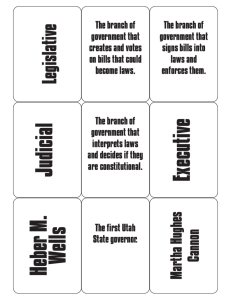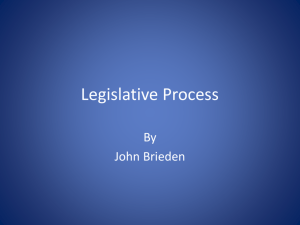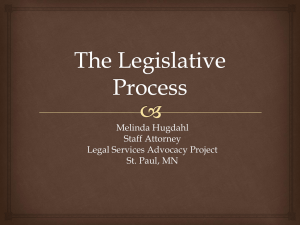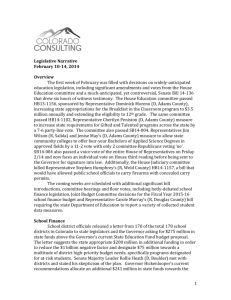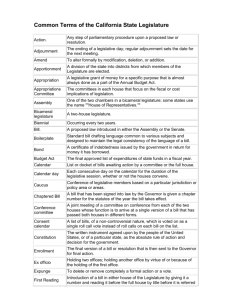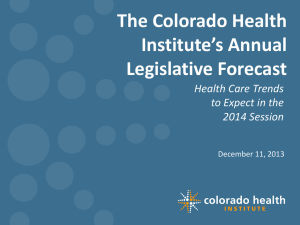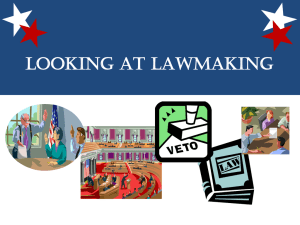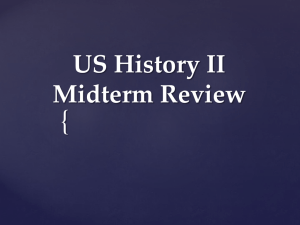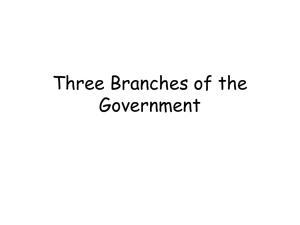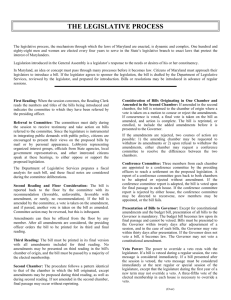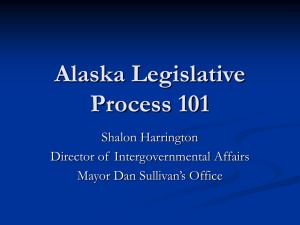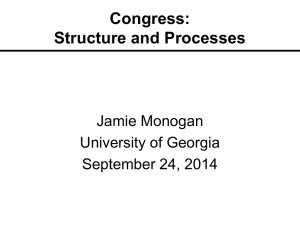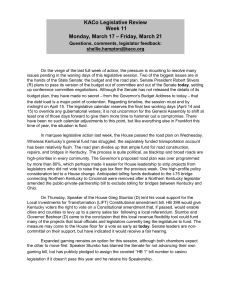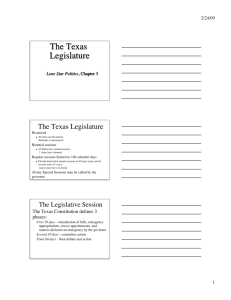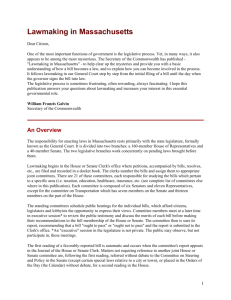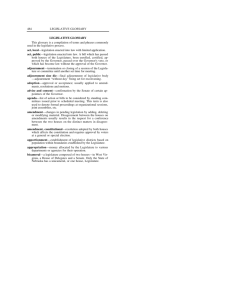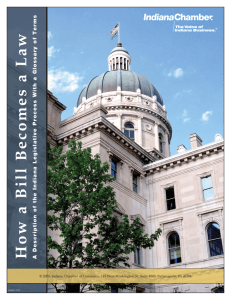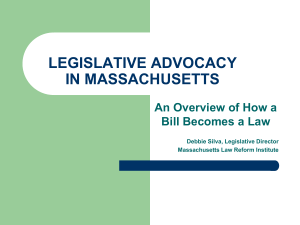Legislative Definitions
advertisement
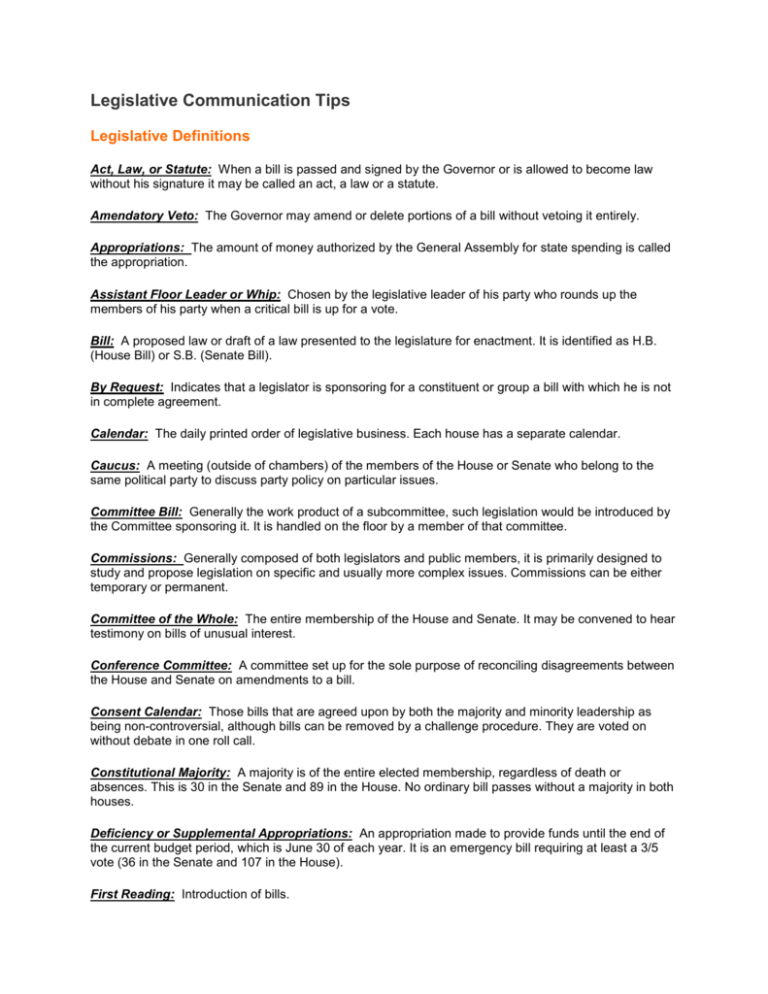
Legislative Communication Tips Legislative Definitions Act, Law, or Statute: When a bill is passed and signed by the Governor or is allowed to become law without his signature it may be called an act, a law or a statute. Amendatory Veto: The Governor may amend or delete portions of a bill without vetoing it entirely. Appropriations: The amount of money authorized by the General Assembly for state spending is called the appropriation. Assistant Floor Leader or Whip: Chosen by the legislative leader of his party who rounds up the members of his party when a critical bill is up for a vote. Bill: A proposed law or draft of a law presented to the legislature for enactment. It is identified as H.B. (House Bill) or S.B. (Senate Bill). By Request: Indicates that a legislator is sponsoring for a constituent or group a bill with which he is not in complete agreement. Calendar: The daily printed order of legislative business. Each house has a separate calendar. Caucus: A meeting (outside of chambers) of the members of the House or Senate who belong to the same political party to discuss party policy on particular issues. Committee Bill: Generally the work product of a subcommittee, such legislation would be introduced by the Committee sponsoring it. It is handled on the floor by a member of that committee. Commissions: Generally composed of both legislators and public members, it is primarily designed to study and propose legislation on specific and usually more complex issues. Commissions can be either temporary or permanent. Committee of the Whole: The entire membership of the House and Senate. It may be convened to hear testimony on bills of unusual interest. Conference Committee: A committee set up for the sole purpose of reconciling disagreements between the House and Senate on amendments to a bill. Consent Calendar: Those bills that are agreed upon by both the majority and minority leadership as being non-controversial, although bills can be removed by a challenge procedure. They are voted on without debate in one roll call. Constitutional Majority: A majority is of the entire elected membership, regardless of death or absences. This is 30 in the Senate and 89 in the House. No ordinary bill passes without a majority in both houses. Deficiency or Supplemental Appropriations: An appropriation made to provide funds until the end of the current budget period, which is June 30 of each year. It is an emergency bill requiring at least a 3/5 vote (36 in the Senate and 107 in the House). First Reading: Introduction of bills. Fiscal Note: The sponsor of legislation having a fiscal impact may be required to file a statement as to the estimated cost of such. This may also apply to legislation with judicial or pension impact. House Proposal: Allows a House member to submit for consideration a written outline for possible legislation, subject to committee action. A proposal may be a prelude to a committee bill. Joint Resolution: A resolution (designated by house of origin as J.J.R. or S.J.R.) requiring action of both houses. It is used to convey opinions or may be related to joint obligations; it is also used to ratify amendments to the U.S. Constitution; it may be used to convey opinion on a national issue on which the General Assembly "memorializes" the Congress or the President. Joint resolutions are required in order to call a constitutional convention or submit a constitutional amendment to the people; in these two cases passage requires at least a 3/5 vote of all elected members of both houses. Joint resolutions do not require gubernatorial approval. Joint Session: A meeting of the House and Senate together. They are primarily ceremonial, to install the Governor and state officers, to hear the Governor's budget and other messages, or to hear a distinguished guest. Bills are never passed in a joint session. Journal: The printed daily proceedings of each house. Legislative Council: A fact-finding and research agency for the Legislature. It makes no recommendations. Legislative Liaison: Person designated by state agencies to act as their "lobbyist". However, they do not register as lobbyists and also have access to the floors of both chambers. Legislative Reference Bureau: The bill-drafting agency for legislators and state agencies. Between sessions it studies statutes for simplifications. It prepares the weekly Legislative Synopsis and Digest. Line Item Veto: The Governor may veto an item in an appropriation bill without vetoing the entire bill. He can also reduce an appropriation. Both actions are subject to override by the General Assembly. Majority Leader: The leader of the majority party in each house. He is chosen by his party members. He has the responsibility for debate on bills which have party support or opposition; he decides floor tactics. He assists in the selection of committee members of his party. Minority Leader: Has the same duties as the Majority Leader in each house but for the Minority party. He assists in the selection of committee members of his party. Minority Spokesman: Designated by the Minority Leader, this person serves as the chief spokesman for the minority members of the standing committee. Perfunctory Session: An abbreviated but official meeting in order to conduct formal business and other "housekeeping chores." No roll call votes are permitted. Postponed Consideration: Legislation which has not received the required number of votes for passage, may, at the request of the sponsor, be placed on the order of "Postponed Consideration" where it can be given a second opportunity for passage at a later date. In the House, such bill must receive at least 70 "yes" votes. President: Chosen by members of the majority party of the Senate. He presides and has a number of other significant responsibilities. Resolution: A simple resolution voted on in one house only (designated H.R. or S.R.). It is used to adopt the rules of the house, to honor some person or achievement, or as a memorial and expression of condolence on a death. It requires no action by the Governor. Roll Calls: Records for the record each individual legislator's vote on 3rd Reading, contested amendments and conference committee reports. A "verified" roll call is when each legislator is called by name and records his vote orally. Rules: Procedures adopted in each biennium by each chamber governing organization, conduct, order of business, bill procedure and so forth. Rules Committee: Composed of leadership from both parties, its most powerful function is to determine which bills will be given a committee hearing in the even-numbered year. Second Reading: The stage in bill passage where amendments on the floor are taken up. Short Debate Calendar: Used in the House, this device is for bills reported out of a committee unanimously or upon a recommendation of screening committees. It limits debate on the bill to a 2 minute presentation by a proponent, and an opponent with one minute to close. It may be opened up to full debate at the request of any 10 members. Sine Die: Final adjournment. No date is set for reconvening. Speaker of the House: Chosen by members of the majority party of the House. He presides and has other significant responsibilities. Special Session: Called by either the Governor or the joint leadership of both houses. Its purpose is to take up specific issues determined beforehand. Table: This term indicates the bill is dead and not to be acted upon, although the rules of both houses outline methods for a tabled bill to become reactivated. Third Reading: Final passage stage for a bill. Veto: If the Governor disapproves of a bill, he may veto it and return it to the house of origin with his objections. A veto may be overridden by at least 3/5 vote of both houses. If he has reduced an appropriation by veto, this can be overridden by a majority vote. He may also recommend changes in a bill, which the Assembly may accept by majority vote or override with a 3/5 vote. Whip: Assistant floor leader in each house for each party. They assist with strategy and roundup members for voting.
